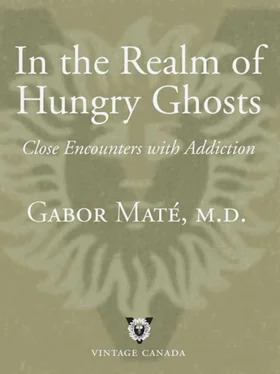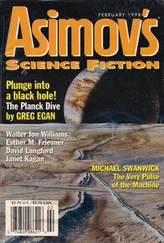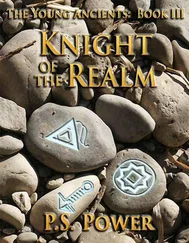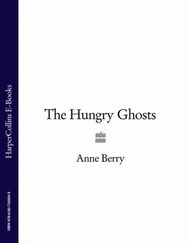Much of our stress comes from mentally living out of our own business. When I think, “You need to get a job, I want you to be happy, you should be on time, you need to take better care of yourself,” I am in your business…I realized that every time in my life that I had felt hurt or lonely, I had been in someone else’s business.
If you are living your life and I am mentally living your life, who is here living mine? We’re both over there. Being mentally in your business keeps me from being present in my own. I am separate from myself, wondering why my life doesn’t work. 4
Partners, friends and family, whether despondently or optimistically trying to pressure the addict to change, would do well to remember the immortal words of Yogi Berra: “If the people don’t want to come to the ball game, there’s nothing you can do to stop them.”
CHAPTER 34

There Is Nothing Lost: Addiction and the Spiritual Quest

All problems are psychological, but all solutions are spiritual.
THOMAS HORA, M.D.
Abarrier for many people when it comes to Twelve-Step work around addiction is Step Two, evoking a higher power: [ We ] came to believe that a Power greater than ourselves could restore us to sanity.
The resistance is natural if the Power is identified as the God by whom the child felt betrayed.
Recall the cry of the cocaine-and heroin-dependent Serena after the death of her grandmother. “You know what I think about God? Who is this God that keeps the bad people behind and takes away the good people?” I was familiar with the rage that poured from her. The same anger vibrated in my chest whenever as a child I saw or heard the word God. “What kind of God would let my grandparents be murdered in Auschwitz?” I used to ask, scornful of anyone who accepted the fairy tale of a good and all-powerful Lord. Like Serena, I thought it was the death of a grandparent that embittered me—but I see now that an even greater loss was the loss of faith within my heart.
Children do not understand metaphors. When they hear “God, our Father” they do not know that these words can stand for the love, unity and creative power innate in the universe. They picture an old man somewhere up above the clouds. To Serena, he may even resemble the grandfather who used to rape her.
“The depressed person is a radical, sullen atheist,” wrote the French psychotherapist Julia Kristeva.” 1At heart the addict may be the most radical and sullen atheist of all—regardless of what her or his formal religious beliefs are. Early stress is a potent inducer of addiction not just because it impairs brain development and emotional growth, but also because it destroys a child’s contact with her essential self and deprives her of faith in a nurturing universe. “I had no mother—God forgot me—and I fell,” says a doomed young girl of fourteen in Robert Browning’s play A Blot on the ’Scutcheon. Serena, in her deep depression, lives in cosmic isolation. Her core anguish is that her sense of trust and connection with the infinite within her and without has been severed. Given all she has suffered, the God they told her was all she needed could not hold her faith intact. For any young person, if the deity she hears about is not manifested in the actions of the people who make up her world, the God-word turns into hypocrisy. If she does retain an image of God, it’s likely to be the vindictive moralizer who judges her mercilessly or the impotent sky phantom I rejected as a child.
We can see the Power in other ways. In the grip of his habit the addict experiences himself as no more than a puny ego that must scratch and grasp and scrounge for every miserable scrap of satisfaction. Honouring the greater power could simply come in the form of finally recognizing the impotence of that small ego, the utter incapacity of its ways to keep a person safe or calm or happy. “I don’t believe in God,” a Narcotics Anonymous member told me, “but at least with Step Two I’ve accepted that I’m not Her.”
“When you know yourselves, then you will be known,” Jesus told his followers, “and you will understand that you are children of the living father. But if you do not know yourselves, then you dwell in poverty and you are poverty.” *36
Even as they speak to eternity, the great teachers employ the language of their particular time, place and culture. The real wisdom is not in the literal meaning but in the spirit of their words. So it is possible to think of “living father” as religious code for the source of life, a reality that exceeds the powers of language to express directly. I believe all of us human beings, whether we know it or not, are seeking our own divine nature. Divine in this context does not mean anything supernatural or necessarily religious, only the truth of our oneness with all that is, an ineffable sense of connectedness to other people and other beings and to each and every shard of matter or spark of energy in the entire universe. When we cease to remember that loving connection and lose touch with our deep yearning for it, we suffer. That is what Jesus meant by poverty. It’s also what the contemporary spiritual teacher Eckhart Tolle sees as the fundamental source of human anxiety:
Basically, all emotions are modifications of one primordial, undifferentiated emotion that has its origin in the loss of awareness of who you are beyond name and form. Because of its undifferentiated nature, it is hard to find a name that precisely describes this emotion. “Fear” comes close, but apart from a continuous sense of threat, it also includes a deep sense of abandonment and incompleteness. It may be best to use a term that is as undifferentiated as that basic emotion and simply call it “pain.” 2
Addiction floods in where self-knowledge—and therefore divine knowledge—are missing. To fill the unendurable void, we become attached to things of the world that cannot possibly compensate us for the loss of who we are.
If I forget, thee, O Jerusalem, let my right hand forget her cunning.
If I do not remember thee, let my tongue cleave to the roof of my mouth;
if I prefer not Jerusalem above my chief joy.
Is the Biblical psalmist merely vowing fealty to a geographical location in this sacred oath, to man-made buildings and houses of worship? I see another, universal meaning that makes much more sense to me: when I neglect that which is eternal within me, I detach from the authentic source of my strength and lose my voice. That, I find, is how it goes in life.
In a state of spiritual poverty, we will be seduced by whatever it is that can make us insensate to our dread. That, ultimately, is the origin of the addiction process, since the very essence of that process is the drive to take in from the outside that which properly arises from within. If we “prefer not Jerusalem”—the “City of Peace” within—above our worldly delights, we fixate on external sources of pleasure or power or meaning. The sparser the innate joy that springs from being alive, the more fervently we seek joy’s pale substitute, pleasure; the less our inner strength, the greater our craving for power; the feebler our awareness of truth, the more desperate our search for certainty outside of ourselves. The greater the dread, the more vigorous the gravitational pull of the addiction process.
Anything can serve as the object of the addiction process, including religions that promise salvation and freedom. The physical entity called Jerusalem has itself become a fetish for many people of several faiths, with bloodshed and hatred being the consequence. It is no accident that in all major religions the most rigidly fundamentalist elements take the harshest, most punitive line against addicted people. Could it be that they see their own weakness and fear—and false attachments—reflected in the dark mirror addiction holds up to them?
Читать дальше













